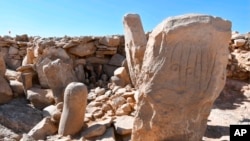Archaeologists in Jordan’s southeast desert have discovered a 9,000-year-old ritualistic complex. It’s the earliest known large human-built structure involving Neolithic hunting communities. Experts say it points to civilization in the Middle East much earlier than originally thought.
Jordan’s antiquities ministry recently announced the discovery of huge human stone structures believed to be the oldest known to date from 9,000 years ago in its southeastern desert plateau area of Jabal Khashabiyeh.
Jordanian archaeologist Wael Abu Aziza told reporters that “they’re the oldest huge human structures known to date.” He said Neolithic hunters living 9,000 years ago used huge stone enclosures to trap wild animals en masse. Also, one structure, thought to be a shrine, contained objects the experts believe to be related to ancient rituals.
Commenting on the discovery, archeologist Pearce Paul Creasman of the American Center of Research in Amman said it was likely older than other similar structures, also found in Jordan, known as the Ain Ghazal statues.
“Absolutely, no question that this is a significant find. The Ain Ghazal statues have been traditionally considered some of the oldest and the most significant of human occupation and so this could possibly be pushing that back, a little bit older,” Creasman said.
A team of international archaeologists—including those from the United States—say the discoveries show how hunting communities in Neolithic times, predating Iraq’s sophisticated Assyrians by several thousand years and who were far less developed, displayed early signs of civilization. At the site were also found children's toys made by these hunters who etched human faces in stone between hunting trips in the Arabian Desert.
“This is absolutely evidence of complex activity from a date doing a level organization that we don’t see all over the place at that time and is kind of a predecessor to what we would generally think of as civilization today," Creasman.
Archaeologists said this major find could change perceptions of early human civilization in the Middle East.




